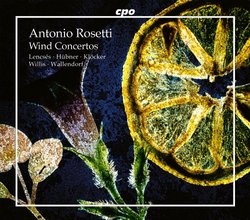| All Artists: Antonio Rosetti, Bohdan Warchal, Holger Schroter-Seebeck, Johannes Moesus, Eckart Hübner, Slovak Chamber Orchestra, SWR Baden-Baden and Freiburg Symphony Orchestra, SWR-Sinfonieorchester Baden-Baden und Freiburg, Bayerische Kammerphilharmonie, Deutsche Kammerakademie Neuss Title: Rosetti: Wind Concertos Members Wishing: 0 Total Copies: 0 Label: Cpo Records Original Release Date: 1/1/2005 Re-Release Date: 9/20/2005 Album Type: Box set Genre: Classical Styles: Forms & Genres, Concertos, Historical Periods, Classical (c.1770-1830), Instruments, Brass, Reeds & Winds, Symphonies Number of Discs: 4 SwapaCD Credits: 4 UPC: 761203716623 |
Search - Antonio Rosetti, Bohdan Warchal, Holger Schroter-Seebeck :: Rosetti: Wind Concertos
 | Antonio Rosetti, Bohdan Warchal, Holger Schroter-Seebeck Rosetti: Wind Concertos Genre: Classical |
Larger Image |
CD Details |
CD ReviewsFormal Daring, Enormous Tunes, Brilliant Solo Parts Joseph Barbarie | new haven, CT | 09/03/2007 (4 out of 5 stars) "Antonio Rossetti (ca. 1750 - 1792) was born Franz Anton Rossler in Bohemia. Like many other central European composers with operatic ambitions (Johann Stich, Johann Christian Bach, and even Mozart), he Italianized his Christian and surnames, and studied the craft of masters such as Pergolesi, Vivaldi, Geminiani, Albinoni. Rossetti's internalization of the fluent Italian style was as thorough-going as Giovanni Cristiano Bach's before him, but Rossetti was able to personalize it, to give it his stamp, in small demonstrations of formal and textural originality.
One such example occurs immediately at the beginning of the Double Horn Concerto in E flat, C56Q (a work which some have attributed to Michael Haydn). Rather than opening with the expected orchestral tutti and its primary and secondary themes, Rossetti has the two hornists enter at once with an announcement of the primary theme. The effect is striking, calling to mind other, more famous, instances of "early" entrances by soloists in classical and romantic concerto repertoire (Mozart's "Jeunehomme" concerto, Beethoven's "Emperor" concerto, Mendelssohn's G minor piano concerto). The rest of the movement proceeds brilliantly, particularly in those sections where Rossetti has the first hornist execute a rapid repeating figure while the second harmonizes a melodic, accompanying part above and around the busy playing of his partner. The hornists, Klaus Wallendorf and Sarah Willis, are particularly impressive in this movement. Rosetti's other works for wind soloists are perhaps not as striking as this Double Horn Concerto, but all are marvelously wrought, tuneful, and orchestrated in stirring fashion. Rossetti's orchestration is shiny but three-dimensional, busy in the strings, often with the real melodic interest submerged in the bass or middle voices. At $35.00 (for three hour-plus discs) this cannot be more heartily recommended. Again, these seemingly "lost" (or at least obscure) masterworks before us as a result of the seemingly endless research by Dieter Klocker. CPO's recording and production values are up to their usual high standards." |
